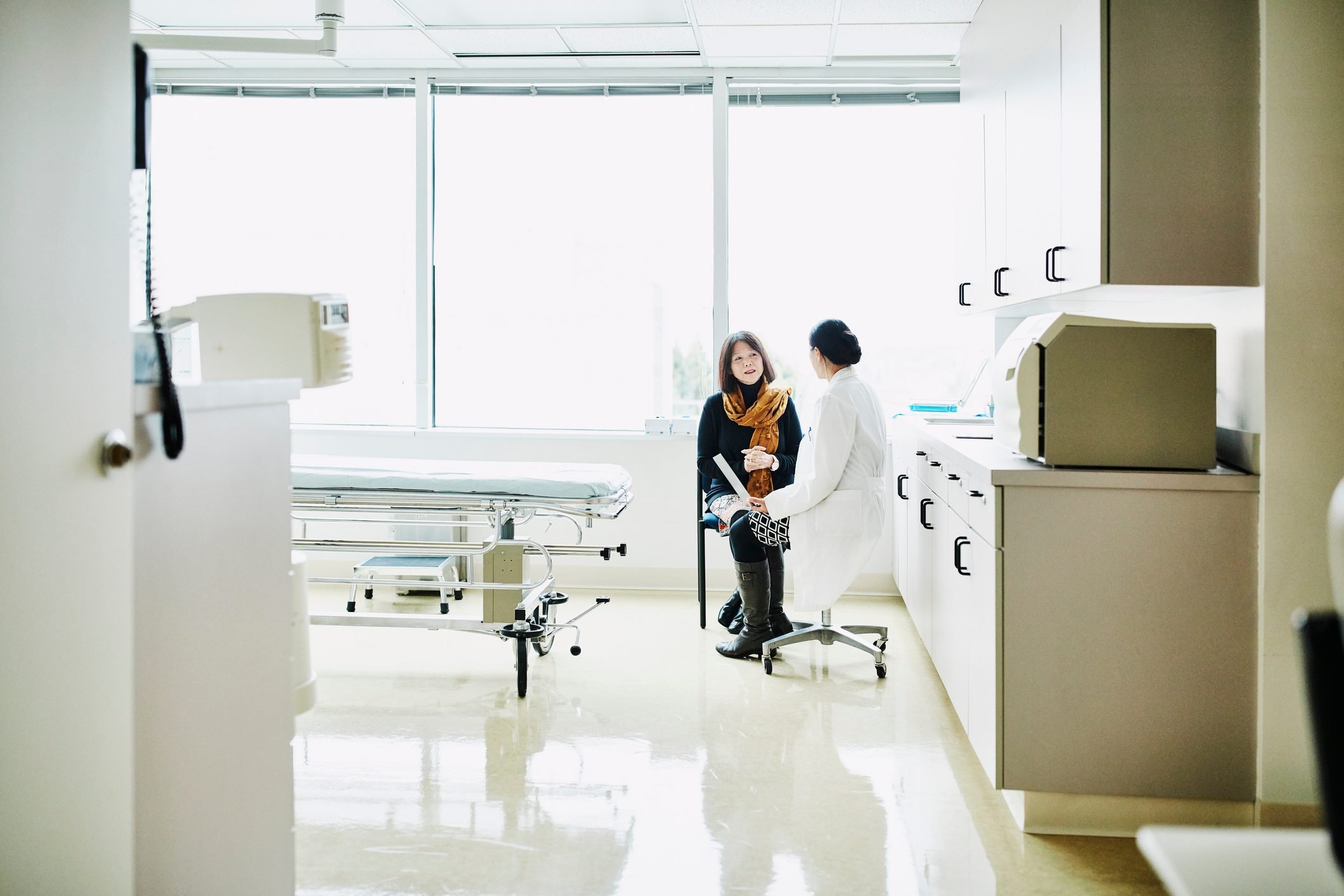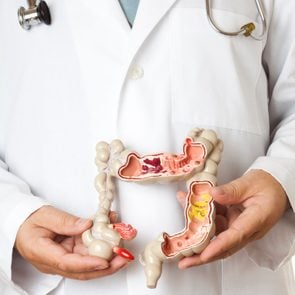8 Ways You Can Prevent Colon Cancer
Updated: Oct. 10, 2022
Lower your risk for colorectal cancer with these colon cancer prevention tips, from getting screened to eating a healthy diet and exercising regularly.
What is colon cancer?
Colorectal cancer is the second leading cause of cancer-related death in the United States.
While rates are declining overall, they are on the rise in younger adults.
Colorectal cancers occur in the large intestine, which is also known as the colon. It includes both colon cancer and rectal cancer, which share similarities despite appearing in different areas of the large intestine. (Rectal cancer occurs in the rectum, which is the last six inches of the digestive tract.)
The American Cancer Society (ACS) estimates that 104,270 new cases of colon cancer and 45,230 new cases of rectal cancer will be diagnosed in the United States this year.
However, there is a bright spot: We know a lot more about the causes of colorectal cancer, and the ways to prevent it, than we did in the past.
For example, most colorectal cancers start from polyps, which are growths in the inner lining of the colon or the rectum. These are common and usually benign. But detecting and removing them can reduce your risk of cancer over time. Certain types of polyps have a high risk of becoming cancerous, while others are usually noncancerous.
From lifestyle changes to better cancer screening tests, you have many ways to help prevent or catch this cancer early.
Risk factors for colon cancer
Colon cancer doesn’t care about gender—it affects men and women at almost the same rate. Men have a 4.3 percent risk of developing colorectal cancer in their lifetime, while women’s risk is 4 percent. So no matter who you are, it’s important to take the recommended steps to lower your risk as much as possible. (These are the signs of colon cancer in women.)
If you have any of the following risk factors, you may be more likely to develop the disease:
- A parent, sibling, or child diagnosed with colon cancer, or a relative diagnosed under age 50
- A family history of an inherited genetic syndrome, such as Lynch syndrome
- Personal or family history of certain polyps.
- Inflammatory bowel disease, such as Crohn’s disease and ulcerative colitis
- A diagnosis of ovarian, breast, or endometrial cancer
- A sedentary lifestyle
- Being overweight or obese
- Eating a lot of red and/or processed meats
- A diet low in fruits and vegetables
- Smoking and drinking alcohol

How you can prevent colon cancer
There’s a lot you can do to lower your risk of colorectal cancer. Here are the cancer prevention tips experts rccommend.
Get colon cancer screenings
Colorectal cancer screening is crucial. It can spot benign polyps, allowing a doctor to remove them before they become cancerous. And it can catch cancer at an early stage.
Though experts agree these screenings are crucial, they differ on when to start. The U.S. Preventive Services Task Force recommends beginning screening at age 50 for people who are at average risk of this cancer. The American Cancer Society, on the other hand, recommends screening beginning at age 45 . You may need to start screening even sooner than that, depending on your risk factors.
Talk to your doctor about when you should start screenings and how often you should get them. People at a higher risk for colorectal cancer may need to be screened more often than is typically recommended for the general public.
Your doctor can explain which test may be best for you. Screenings generally fall into one of two categories: stool-based tests and visual exams. They include the following.
Stool tests
Stool tests detect blood and/or altered DNA in your stool. Depending on the test, it can be done every one to three years. These tests include:
- Guaiac-based fecal occult blood test (gFOBT): Uses a chemical called guaiac to look for blood in the stool. It’s done once a year.
- Fecal immunochemical test (FIT): This test uses antibodies to detect blood in the stool. It’s done once a year.
- FIT-DNA test: For this test (also known as a stool DNA test), you’ll send an entire bowel movement to a lab, which will check for cancer cells. It’s done once every three years.
(Here’s what you should know about using at-home colon cancer tests.)
Flexible sigmoidoscopy
A short, thin, flexible tube is inserted into your rectum to check the rectum and lower third of your colon for polyps or cancerous changes.
How often to get it: Every five years
Colonoscopy
During a colonoscopy, the doctor inserts a long, thin, flexible tube into your digestive tract to look for polyps or cancerous changes in your rectum and entire colon. A colonoscopy isn’t just a screening tool; it’s a cancer-preventing tool.
“A colonoscopy can save lives,” says Emmanouil Pappou, MD, colorectal surgeon at Memorial Sloan Kettering Cancer Center in New York City.
It can take years for small polyps to accumulate mutations and turn into colorectal cancer. Your doctor can remove polyps found during a colonoscopy, cutting off the chance it’ll develop into cancer. (Here are the best colonoscopy prep tips from doctors.)
How often to get it: Every 10 years
CT colonoscopy
Also called a virtual colonoscopy, this test uses X-rays and computers to produce images of the colon, which the doctor examines.
How often to get it: Every five years
Eat a healthy diet
Diets that are low in fruits, vegetables, and whole grains, and high in red and processed meats, may increase your risk for colorectal cancer, says David Liska, MD, director of the Center for Young-Onset Colorectal Cancer and director of the Weiss Center at the Cleveland Clinic in Ohio.
Due to the link to colorectal cancer, the World Health Organization considers processed meat a carcinogen (any substance that has the potential to cause cancer) and red meat a potential carcinogen.
Meat that is smoked, cured, fermented, or salted to preserve or enhance the flavor is considered a processed meat. Some examples are bacon, ham, beef jerky, hot dogs, and canned meat.
Red meat includes beef, pork, veal, lamb, and others (although the link isn’t as strong as it is for processed meat).
On the flip side, Dr. Liska says, eating fruits, veggies, and whole grains appears to be protective, possibly because of their high fiber content.
A review in 2021 in JAMA Network Open concluded that people who consume higher intakes of fiber, dietary calcium, and yogurt, as well as less alcohol and red meat, have a lower risk of this cancer.
When it comes to fiber, “it’s possible that having stool move through intestines faster makes intestinal cells exposed to fewer carcinogens in the stool, but that’s not entirely clear,” he says.
Yogurt may help populate the microbiome with “good” bacteria that’s protective in the gut, though it is less clear what role calcium plays in the equation.
The American Institute for Cancer Research (AICR) recommends eating at least 30 grams of dietary fiber each day. Rather than worrying about hitting that mark right away, do what you can to gradually increase the amount of fiber you’re eating.
Each 10-gram increase in fiber intake per day corresponds to a 7 percent lower risk of colorectal cancer, says AICR. What’s more, if you fill your plate with these types of foods, you’ll naturally crowd out the less-healthy, fatty foods, says Milena Gould Suarez, MD, a gastroenterologist and associate professor at Baylor College of Medicine in Houston.
Don’t smoke
Not only does smoking cigarettes increase your risk of developing colorectal cancer, it also means you are less likely to survive if you are diagnosed with it.
A meta-analysis of 188 studies, published in The American Journal of Gastroenterology, found that smokers had a 14 percent increased risk of colorectal cancer compared with people who never smoked.
The number of cigarettes smoked per day, along with a greater number of years spent smoking correlated to a higher risk of developing this cancer.
The good news is that quitting smoking helps lower your risk. (These are the best ways to quit smoking.)
Limit alcohol
In a 2018 study of people of various races and ethnicities, consuming 15 to 30 grams of alcohol per day (one standard drink contains about 14 grams of alcohol) correlated to a 16 percent increased risk for colorectal cancer compared with abstaining from alcohol.
The study was published in the American Journal of Epidemiology. (Follow these tips to limit alcohol.)
Maintain a healthy weight
Obesity is a risk factor for a variety of cancers. People who are obese are 30 percent more likely to develop colorectal cancer compared with those who have a lower body mass index (BMI), according to the National Cancer Institute.
While the risk has been found to be higher in men than women, there is a BMI link for women as well.
In a 2018 JAMA Oncology study, researchers found that obese women were 93 percent more likely to be diagnosed with early-onset colorectal cancer than women who had lower BMIs.
Overweight women had a 37 percent greater risk than other women.
Exercise regularly
Regular exercise can help protect against colon cancer, says Dr. Liska.
In a review of more than 540 studies in the British Journal of Sports Medicine, the strongest evidence for physical activity having anti-cancer benefits applied to colon and breast cancers.
Moving more helps reduce body fat and inflammation, and helps control insulin levels, all of which may drive cancer. (Not sure where to start? Try these simple tips to start exercising when you’re overweight.)
Control type 2 diabetes
People who have been diagnosed with type 2 diabetes have an increased risk of colorectal cancer, and the link seems to be independent of excess body fat or lack of physical activity.
One in three adults have prediabetes (a precursor to type 2 diabetes), and most don’t know that they have it.
If you do not know where you stand, ask your doctor for a simple blood test to check your blood sugar levels. (Here are the prediabetes mistakes to avoid.)
Healthy eating and exercise can help prevent or delay type 2 diabetes, and medication can also help keep blood sugar under control.
Discuss certain medications with your doctor
Some people in their 50s who have a high risk for developing heart disease are advised to take a low-dose aspirin. The drug may also offer a bonus benefit of decreasing the odds of developing colorectal cancer, too.
Yet the American Cancer Society doesn’t recommend taking the medication for the sole purpose of preventing colon cancer. That’s because a potential side effect of taking aspirin daily includes gastrointestinal bleeding. (Read this before taking aspirin for health benefits.)
Some menopausal women opt to use combination hormone replacement therapy (HRT) that includes estrogen and progestin, although it’s recommended that women take the lowest dose for the shortest period of time possible. Research suggests that combination HRT may lower the risk of developing invasive colorectal cancer in this group, according to the National Cancer Institute.
That said, women who use HRT are also more likely to be diagnosed with more advanced cancer, and HRT may increase the risk of breast cancer, heart disease, and blood clots. Talk to your doctor about any risks and benefits of medication.
(Here’s what to know about HRT and breast cancer risk.)
When to see a doctor
Colon cancer is one of the most common cancers in the United States. You can mitigate your risk by following a healthy lifestyle that includes a well-balanced diet, regular exercise, and prevention protocols like getting screened according to your age and level of risk.
Remember, if you have any risk factors or begin to experience colon cancer symptoms, such as changes to your bowel habits, blood in your stool, and unexplained weight loss, talk with your doctor to identify the cause.
Next, learn about a man who was diagnosed with stage 4 colon cancer at age 30.



